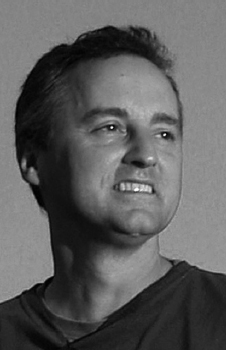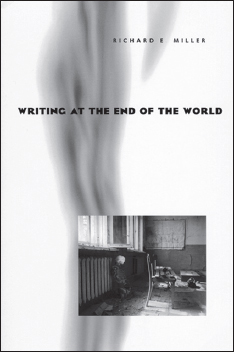26.1 Richard E. Miller

RICHARD E.
MILLER
Richard E. Miller is professor of English and the executive director of the Plangere Writing Center at Rutgers University. He received his BA from St. John’s University, his MA from the University of Massachusetts at Boston, and his PhD from the University of Pittsburgh. He is the author of As If Learning Mattered: Reforming Higher Education (1998), Writing at the End of the World (2005), and, with Kurt Spellmeyer, a textbook, The New Humanities Reader (third edition, 2008).
Throughout his career, Miller has looked at schooling in the United States and, in particular, at the required curriculum in English — a literature course and a composition course — and he has asked big questions. For example, in Writing at the End of the World, he says:
In a secular society, education is the most powerful resource citizens have to ensure a brighter future for themselves. But what is one to do when the future includes a radioactive wasteland in the northern Ukraine? The smoldering ruins of the World Trade Center? Looted museums in a bombed-out Baghdad? No meaningful discussion of the humanities can proceed without confronting such examples of human depravity and indifference. Who, surveying the ruins at Chernobyl, would be persuaded either by Matthew Arnold’s argument that we are ennobled by studying the best that has been thought and said in our time or by those who maintain that the work in the humanities provides the foundation for a critical engagement with the world? (pp. ix–x)
Here is what Miller says about his own teaching. Since he is referring, in part, to his teaching in first-year writing courses, a course occupying the same curricular slot as the one you are taking, this is worth quoting at length.
When I am back in the classroom, I work at getting the students to use their writing not just as a tool for making arguments, but also as a lens for exploring complexity and a vehicle for arriving at nuanced understandings of a lived reality that is inescapably characterized by ambiguities, shades of meaning, contradictions, and gaps. That’s a long way to try to take undergraduates in one course in one semester, but this is what I believe the function of a secular public education should be: to provide training in the arts of solving the problems of this world, training that recognizes that people, who never leave behind their embodied histories and their cherished beliefs, can’t be revised the way papers can. (pp. 196–97)
His goal, he says, for himself and for his students, is

learning how to speak in ways that others can hear, in finding a way to move and be in more than one world at once. This isn’t the only answer and it isn’t always the answer, but learning how to look for such answers and finding out how to implement the evanescent solutions the search itself suggests is the primary function of the humanities as I conceive them. The practice of the humanities, so defined, is not about admiration or greatness or appreciation or depth of knowledge or scholarly achievement; it’s about the movement between worlds, arms out, balancing; it’s about making the connections that count. (p. 198 of the print book)
Miller is a brilliant essayist and an innovative thinker. He has turned his attention increasingly to multimedia composition, composition in digital environments, both in his own writing and as a necessary next step for the teaching of English. For an example of this work, at nmc.org you can access a presentation he gave to the Modern Language Association: “This Is How We Dream, Parts 1 and 2.”